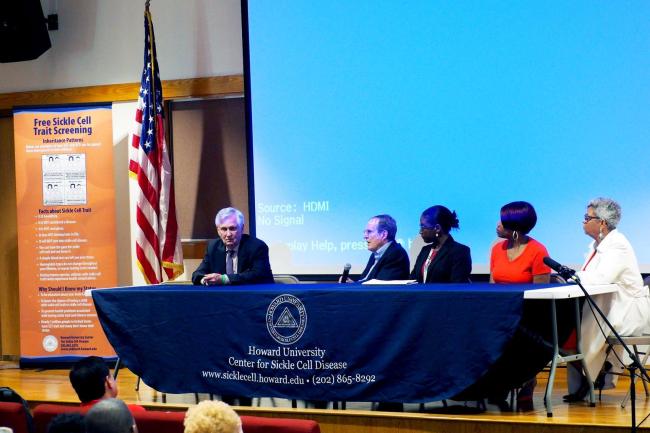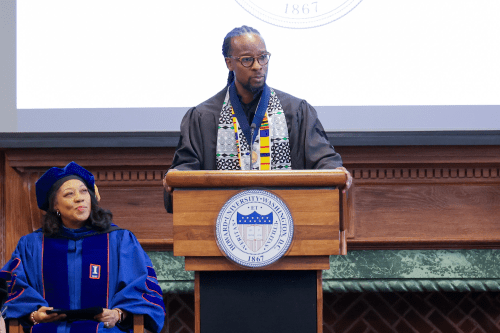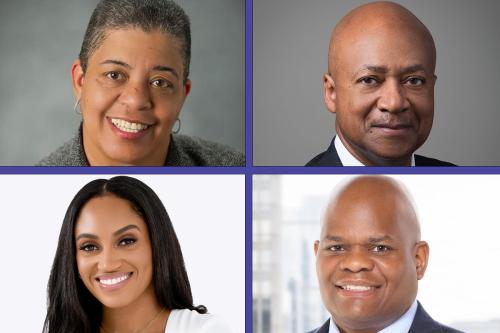WASHINGTON (June 27, 2019) – The Howard University Center for Sickle Cell Disease recognized World Sickle Cell Day on June 19 with a major symposium that focused on the need for new resources and the fight for a universal cure.
This year marked the 10th anniversary of World Sickle Cell Day and the sixth year the Howard University Center for Sickle Cell Disease has held a major program to bring awareness to the disease. The event, held at Howard University Hospital, drew about 150 scientists, medical professionals, and many members affected by the disease from the community.
This year’s event focused on the “Cure Sickle Cell Now Initiative” (#CureSickleCellNow). The White House announced in September new support to find a cure the disease.
In an annual update on the disease, James G. Taylor, M.D., director of the Center for Sickle Cell Disease, spoke about the need for more physicians trained to care for adult patients. He also addressed the need for more research investigators and greater research funding. Dr. Taylor pointed to greater strides toward international cooperation as a positive development. The Howard University Center for Sickle Cell Disease has signed two agreements for collaboration with the Republic of Congo.
Dr. Taylor said the center at Howard University is treating about 350 adult patients in the region, a number that has grown about 15 percent compared to last year. He commended the center for making a measurable impact on care for patients. However, on the research front, Dr. Taylor said there are too few doctors involved in treatment and research.
“There are disparities in clinical care and research funding, and poor implementation of treatment,” Dr. Taylor said. “Most patients aren’t getting the two FDA-approved drugs for sickle cell disease. Even if we get a cure today, we don’t have enough patients volunteering for clinical trial studies to implement it.”
The Howard symposium's featured speaker was Freda C. Lewis-Hall, M.D., chief patient officer and executive vice president of Pfizer, and Howard University College of Medicine alumna. She said the scientific community is on the cusp of new medicines and therapies for sickle cell.
“The good news part of the story is science is catching up to our needs,” Dr. Lewis-Hall said. “We have ‘Star Wars’ science on the horizon for sickle cell disease.”
Dr. Lewis-Hall spoke about ethnographic research into clinical trials that has uncovered new information about clinical trial barriers described by patients. She said such research could lead to improvements for the problem of lack of participation in clinical trials.
Some patients suffer in crisis for hours and days instead of going to the emergency room because in some cases they don’t have transportation or ambulances wouldn’t take them to hospitals they trust, she said.
Tesha Samuels, a Maryland resident who attended the conference, spoke about her experiences in an NIH trial at symposium. She said participation in the research trial changed her life. Samuels said the benefits of participating in the clinical trial outweighed the risks.
“I spent years trying to search for something that would work for me,” Samuels said. “I am so grateful for the scientists and the doctors who are fighting for us on the frontlines. One year later, I have been given a new opportunity at life.”
Howard University’s Center for Sickle Cell Disease was founded in 1972 by the late Roland B. Scott, M.D. and has a distinguished history of leading clinical investigation in sickle cell disease. Sickle cell disease is a hereditary blood system disorder prevalent in African Americans and many other people of African descent throughout the world. About 100,000 Americans suffer from the disease.
Sickle cell disease is a group of blood disorders typically inherited from a person’s parents and the most common type is known as sickle cell anemia. The disease begins around the age of five to six months and a number of health problems may develop such as pain, anemia, swelling in the hands and feet, bacterial infections and stroke. Around the world, about 4.4 million people have sickle cell disease and 43 million have the sickle cell trait.
###
For media inquiries, please contact Sholnn Freeman, Howard University communications, sholnn.freeman@howard.edu
About Howard University
Founded in 1867, Howard University is a private, research university that is comprised of 13 schools and colleges. Students pursue studies in more than 120 areas leading to undergraduate, graduate and professional degrees. The University operates with a commitment to Excellence in Truth and Service and has produced four Rhodes Scholars, 11 Truman Scholars, two Marshall Scholars, one Schwarzman Scholar, over 70 Fulbright Scholars and 22 Pickering Fellows. Howard also produces more on-campus African-American Ph.D. recipients than any other university in the United States. For more information on Howard University, visitwww.howard.edu.





